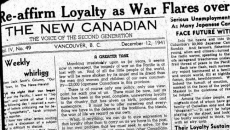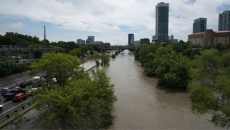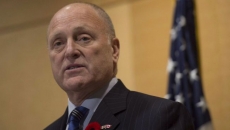1. As President and CEO, what are some key areas of growth that you will focus on?
Surrey as a city is at a very exciting, critical juncture. Our community continues to grow rapidly, and we will soon be the biggest city in the province. The Surrey Hospitals Foundation wants to ensure that we grow Surrey’s facilities and programs to deliver exceptional healthcare across our diverse community, not just now but in the future.
Our donors have such an important role to play in this. In addition to funding urgent needs like what has been done for cardiac catheterization labs, the Foundation will introduce a new Pillars of Care model, which will offer donors the chance to champion specific areas of healthcare that are close to their hearts.
2. What are some challenges that you’ve already faced in your new role?
Managing growth, I think, is a key theme. We have big plans and a bold vision for supporting our region’s healthcare needs. I have been in the role for six months now and feel responsible for delivering for this community and addressing our needs across facilities. While not necessarily a challenge, my real focus is building culture and investing in the Foundation team. We have an amazing new team with so much passion and talent. I am very mindful of the importance of fostering a strong, supportive culture where people want to work, not only because it is the right thing to do on the people side of things but also because it’s essential to meet our ambitious goals.
3. With the recent healthcare crisis at Surrey Memorial Hospital, how do you hope the foundation's work will transform care for residents South of the Fraser?
It’s worthwhile to note that Surrey is home to several healthcare facilities that the Foundation supports. In addition to Surrey Memorial Hospital, we also have the Jim Pattison Outpatient Care & Surgery Centre and the wonderful Czorny Alzheimer Centre. To be added soon is the new hospital in Cloverdale (currently under construction) and a new critical care tower at Surrey Memorial. Surrey is a diverse community, making it a fantastic and logical place for research. Surrey Memorial is already the location of many research studies. SFU is opening a medical school in Surrey. I see an enormous opportunity to establish Surrey as a healthcare research hub.
4. As a Métis, Jamaican, Scottish, and Welsh woman, how has your heritage influenced your career path?
We are all products of our upbringing and experiences. My parents overcame many hardships to provide my siblings and me with a secure, loving home and opportunities that weren’t available to them. As core values, they instilled in us a belief that we could do anything if we worked hard towards it, that we should treat all people equally with kindness and respect, and that we should be responsible for giving back to our community. As a woman of color, my mother overcame many barriers common to her time. As a mother myself, I’ve instilled these same values in my daughter, who, at 29, is a remarkably kind, loving human with a career she loves. These values naturally drew me to the charitable sector, where I embrace the opportunity to help improve some of our most complex social issues.
5. What is your vision for inclusivity within the Foundation and its work in healthcare for Surrey?
Inclusivity within the Foundation team is so important – none of this is possible without a team that is committed to the vision and empowered to bring their best to work daily. To achieve this, we must create a space that allows diversity of thought, inclusion, and empowerment. It is important to include our partners in this work, many of who are your readers, our donors, the facilities, and healthcare workers who play a pivotal role in helping make these goals and visions possible. Surrey is home to a wonderfully diverse population, and it is particularly important to consider inclusivity when choosing which initiatives we fund. Healthcare needs to be designed to consider how different people prefer to receive treatment.
6. How will your leadership style differ from the former President and CEO Jane Adams?
I never had the pleasure of working with Jane, but I met with her following my appointment to the role. She was incredibly gracious and passionate about supporting the region's healthcare needs. One thing I know about leadership lies in the saying: we stand on the shoulders of those who came before us. Jane led the Foundation through so many great successes and growth, bringing us to this point and time. I know there is still a lot of work ahead of us, and I am committed to advancing this growth for all of our residents.
7. What past projects have you taken pride in that the Foundation has executed?
The Foundation has achieved so much with the community, and there is much to be proud of. Since I started, I have been inspired by the pride and passion of our staff, and we want to continue to support attracting and retaining the best people to our facilities. Looking ahead, we are excited to see the new kidney care unit open next year. The unit will have 21 new dialysis stations, bringing the total to 60 at Surrey Memorial Hospital, enabling the hospital to help more patients and lessen wait times.
8. Tell us about some upcoming projects the Foundation is working on.
We are in the final stretch of the $10 million campaign to build two cardiac catheterization labs at Surrey Memorial Hospital. $8 million raised, $2 million to go. Given heart disease is the leading cause of death among people 65 and older, we really need to have this care available south of the Fraser. It will also allow tests and procedures to diagnose and treat heart problems before they cause larger issues. In terms of new funding initiatives, we look forward to announcing an expansion of our cancer services, including establishing a regional surgical robotics program at Surrey Memorial. We have recently approved funding for ultrasounds for the highest-risk pregnancies and support for CareLife Fleetwood, the only long-term care facility in the region that can accommodate residents requiring ventilated breathing support.
9. With nearly 25 years of experience in the corporate and non-profit sectors, what's your strategy for creating impact through your work for Surrey residents?
One of the biggest things I learned is that nothing is accomplished alone. I’ve had the privilege of working alongside many incredible leaders, many of whom attribute their success to the support and guidance of those around them, and I’d have to agree. These are big issues we are tackling at the Foundation, and to truly drive impact, we have to listen to Surrey residents about their needs and concerns.
10. What message would you like to share with the South Asian community?
Firstly, our gratitude, you are such a critical partner in the work we do, and great advocates for our city. We want you to know that the Foundation, the hospitals, and the dedicated staff are here for you. The South Asian community has a long history of being incredibly generous donors. I look forward to working with you to ensure that we can provide the best healthcare possible, now and in the future.






